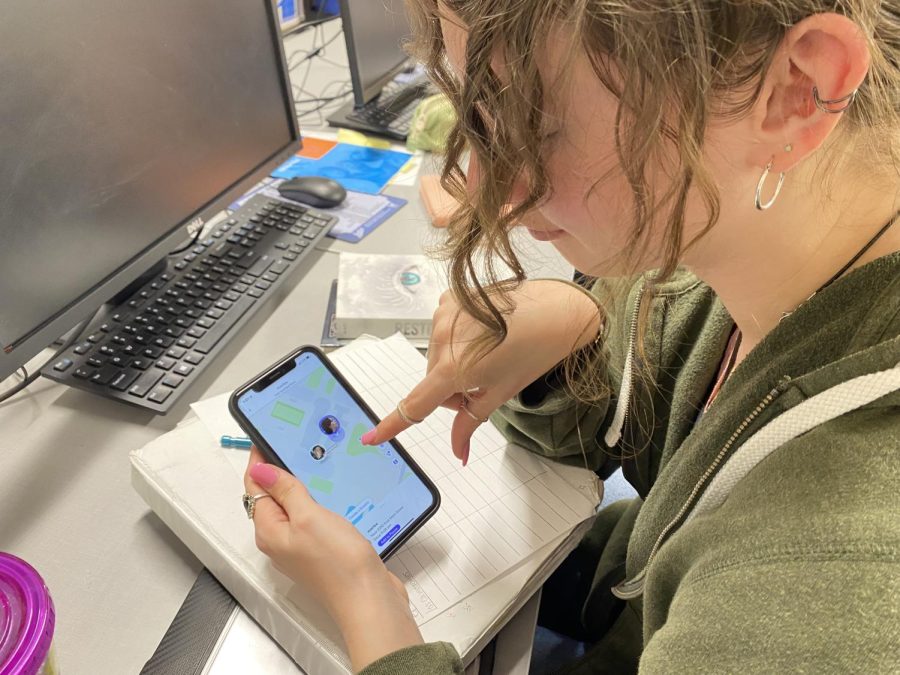Ethical Debate of Phone Tracking
Is phone tracking partners, friends and family ethical?
Marlee Allen (10) looks at her friend’s location on Life360.
April 25, 2022
Phone tracking apps have become new tools for teenagers and parents as teens become more inclined to social connection, and parents push for stronger means of connection to their increasingly independent children.
Journee Lawhorn (11) sees many benefits in phone tracking, emphasizing that her friends and family’s safety is one of her top priorities.
“I enjoy knowing that my friends and family members are safe. I can see if they get into car accidents, if they made it home safely, a lot of things. It’s refreshing to know they’re safe,” Lawhorn said.
With the app, Life360, users have the availability to track live locations, cell phone battery life, location history, driving reports, and crash detection of partners, friends, and family members who have the app. Life360 is predominant in many of today’s parent-child relationships. According to an article by The Markup, a nonprofit organization that focuses on data-driven journalism, Life360 has over 33 million users. The app provides a new level of comfort for millions of friend groups and families around the world. It is especially resourceful for families deprived of security.
Even though parents view tracking apps as a helpful tool to ensure their children’s safety, monitored children may see those apps as an invasion of privacy.
Dustin Thongkhanvilay (11) empathizes how the tracking app has only intensified at-home dilemmas and has affected his relationship with his parents.
“My parents use Life360 to monitor what I’m doing and where I’m at. It’s an invasion of privacy. It does nothing but cause trust issues,” Thongkhanvilay said.
The use of tracking apps violates the mutual trust among family members that cultivates a positive parent-child relationship. Constant monitoring has been shown to damage parent and teen relationships while also harming the child’s development. Teens and young adults who feel like they’re always being watched can develop anxiety issues and suffer from lack of confidence. Although parents may trust their kids and believe they will make the right choices, the use of tracking apps implies that they do not truly have faith in their children. This can be disheartening and discouraging for kids and adolescents. The sense of distrust makes children less likely to confide in their parents when a situation arises.
An article from Psychology Today, a media organization with a focus on psychology and human behavior, stresses the effects of parental control on children via tracking apps.
“A parent’s role is to provide age-appropriate guidance, structure, and support. It’s not to hover and spy. Apps that are perceived as invasive and spying will drive the very activities you need to monitor underground. In all cases, its uses should be evaluated for the benefits, not for policing capabilities. Protecting teens from themselves won’t be solved by an app.”
Snapchat’s function, Snap Map, enables snapchat users to display their current location to their Snapchat friends. The data is so specific, that Snapchat users could pinpoint a friend’s location in a specific town, street, and building. The app enables users to see what their friends are up to, but some users show discomfort from the app’s feature.
Selena Mok (11) feels uncomfortable using social media apps that display her geolocation data.
“I don’t like knowing that people know exactly where I am at, or what I’m doing every moment of every day. It creeps me out so much. Most tracking apps give people a reason to bud into other people’s lives,” Mok said.
In an online post from ChildNet International, a child safety group, the group emphasizes the importance of user safety with Snap Map.
“Given how specific this new feature is on Snapchat – giving your location to a precise pinpoint on a map – we would encourage users not to share their location, especially with people they don’t know in person,” said the group. “It is important to be careful about who you share your location with, as it can allow people to build up a picture of where you live, go to school and spend your time.”





